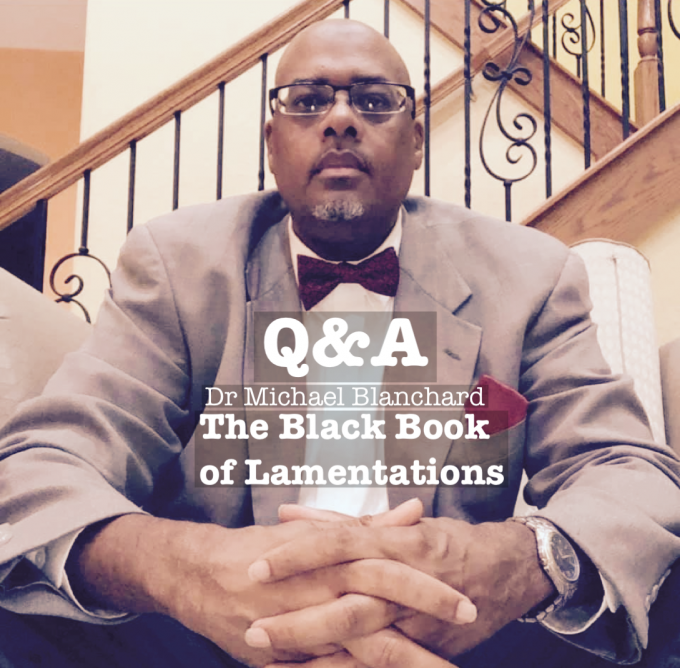
“Imagine my surprise upon finding out I was one of the ‘brilliant minds’ featured in the Black Book of Lamentations, a book of life changing quote. It is an honor, the minute I heard I wanted to know more, hence this Q&A, the prequel to our podcast session.” – Nyota Uhura
NYOTA:The Black Book of Lamentations can be described as black ingenuity in print, a book of anecdotes and quotes from grassroots activists that speak directly to their struggle. How did you come up with the concept?
DR MICHAEL BLANCHARD: I began using social media in 2013 as a way of educating others and to learn from others as well. From about 2013 to the present I began noticing the wealth of talent, knowledge and intelligence from what I call the “Grassroots Scholars or what some call real community activists. These Grassroots voices appeared to have a consistent message that the Black collective was on the wrong path towards improving the quality of life for our people and the strategies used in the past were no longer effective today.
My concept for the book sprung from the new ideas, theories, strategies and theories that emanated from these Grassroots Scholars that are too many to name. Many of these voices inspired me to write this book to provide a new perspective that I witnessed over the past 7 years that is a call to action to pursue new strategies, ideas, and theories that will produce new leadership and activism.
NYOTA: Your book is a treasure trove of mini messages to the grassroots, (a reference to Malcolm X’s “Message to the Grassroots”), based on real, applicable experiences, what was the commonality in the voices amplified?
DR BLANCHARD: The commonality or main theme from these amplified voices are to pursue and develop new actionable strategies for the Black collective that will improve the quality of life for our people. These voices in real sense are sounding the alarm that we need to begin building and funding our own life sustaining resources because our communities only hope is in becoming independent and self-sufficient.
NYOTA: Love the concept and am honored to be a part of this project. Not only does it amplify voices like mine, it lends credence to my voice and other voices people may not know. A lot of people are wary or maybe a better word is skeptical of protesters, activists and revolutionaries they meet online because online anyone can be anything. How did you find the diamonds in the rough?
DR BLANCHARD: I engaged most of the authors of the quotes within the pages of my book over a 7-year time period or so you could say they were vetted. Its very difficult to fake activism when you truly engage someone by asking difficult questions. I’m sure you recall me engaging you and many others about various topics and having actual phone conversations not only about the knowledge posted, but also about “boots on the ground” work being done in our neighborhoods. All the knowledge, debating, and writing means nothing if it can’t inspire people to use whatever gift or skill the creator blessed them with to help improve their community.
NYOTA: The Black Book of Lamentations breaks down the complex in quotes, something very much needed at a time we’re dealing with complex issues, the world is changing and we’re facing uncertainties. Can you expound upon that?
DR BLANCHARD: Sure. This book uses the amplified voices of our grassroots scholars to identify inconsistencies, falsehoods, outdated theories, strategies and ideas. Many of the authors of these quotes developed new strategies, theories, ideas or new ways of looking at complex issues through critical thought and analysis. For example, you (Nyota) have a gift of critical thought and analysis that helps you break down complex political, social and economics issues that even the most learned scholars have a problem doing because they’re trapped in their own limited ideology.
NYOTA: Dr Rick Wallace said, “Quotes have the power to reshape one’s thinking altogether”. How has putting this project together reshaped your thinking?
DR BLANCHARD: Working on this project has made increasingly more cognizant of focusing on the application of the knowledge and information I digest within my mind. If what I am consuming into my mind doesn’t inspire myself and others to act; it’s of no value to the Black collective. Clearly, the 7 years I’ve spent reading and critically thinking about the quotes of these brilliant grassroots scholars has positively shaped how I process information and has improved my ability to analyze and seek viable solutions to the challenges facing our communities. Quotes have the power to inspire us all to think about whether the Black collective’s thinking is producing results from our collective actions or whether our group thinking is a major stumbling block to Black progress? And if we agree it is a major stumbling block then we must begin the process of “Undoing the African American Mind.”

